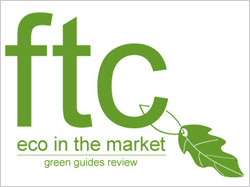packaged goods
New FTC 'Green Guides' Warn Against Vague Claims
- by Karlene Lukovitz @KLmarketdaily, October 2, 2012
 The Federal Trade Commission has issued its final
revised “Green Guides,” which provide marketers with guidance for ensuring that environmental claims about products are truthful and non-deceptive.
The Federal Trade Commission has issued its final
revised “Green Guides,” which provide marketers with guidance for ensuring that environmental claims about products are truthful and non-deceptive.
One major take-away: Marketers are warned not to make “broad, unqualified” claims like “eco-friendly,” “environmentally friendly” or “green.”
The FTC said that “very few products, if any” have all of the far-reaching environmental benefits that consumers tend to perceive from such claims, making the claims “nearly impossible to substantiate.”
The Guides stress that marketers should qualify general claims with specific environmental benefits, and that such qualifications should be clear and prominent.
advertisement
advertisement
Originally created in 1992, the Guides were last updated 14 years ago, in 1998. They are not regulations; instead, they clarify how the FTC is likely to view various types of environmental claims as part of its policing against all kinds of deceptive marketing/advertising claims under Section 5 of the FTC Act.
The FTC gathered comments and input after releasing proposed Guides revisions in fall 2010. The core elements remain in the final version.
However, one notable change is that marketers that make a claim that a product has an overall environmental benefit because of a specific attribute need to do an analysis to ensure that other trade-offs don’t outweigh the claimed benefit.
For example, the FTC notes that claiming “green, made with recycled content” may be deceptive if the environmental costs of using recycled content outweigh the environmental benefits of using it.
Also, the revised guidelines state that marketers shouldn’t make general claims qualified with a “small or unimportant” benefit claim.
The FTC’s rationale: “When a marketer qualifies a general claim with a specific benefit, consumers understand the benefit to be significant.”
As with previous versions, the new Guides do not address use of the term “organic” – which is regulated by the U.S. Dept. of Agriculture – or the two most controversial and undefined terms used in green marketing: “natural” and “sustainable.”
The new Guides include updates to existing guidance, including proper use of source-reduction claims and claims including the terms compostable, ozone, recyclable and recycled content.
They also include new sections on the use of carbon offsets, “green” certifications and seals, and renewable energy and renewable materials claims.
Some highlights:
* Marketers shouldn’t make an unqualified “degradable” claim for a solid waste product unless they can prove that the entire product or package will completely break down and return to nature within one year after customary disposal. That means that unqualified “degradable” claims should not be made about any items destined for landfills, incinerators or recycling facilities, since these will not degrade within a year.
* Marketers should qualify recyclable claims when recycling facilities are not available to at least 60% of the consumers or communities where a product is sold. The lower the level of access to appropriate facilities, the more a marketer should emphasize the limited availability of recycling for the product. If recycling facilities for a product are not available to at least 60% of consumers or communities, a marketer can state: “This product may not be recyclable in your area.” If recycling facilities for a product are available to only a few consumers, a marketer should use stronger qualifying language: “This product is recyclable only in the few communities that have appropriate recycling programs.”
* Marketers should make recycled content claims only for materials that have been recovered or diverted from the waste stream during the manufacturing process or
after consumer use. They should qualify claims for products or packages made partly from recycled material (for example, “Made from 30% recycled material”).
* Marketers
shouldn’t make unqualified renewable energy claims based on energy derived from fossil fuels unless they purchase renewable energy certificates (RECs) to match the energy use.
* Marketers who claim that their product is “non-toxic” need competent and reliable scientific evidence that the product is safe for both people and the environment.
* Marketers should not use environmental certifications or seals that don’t clearly convey the basis for the certification, because such seals or certifications are likely to convey general environmental benefits. Also, certifications and seals may be considered endorsements, which are covered by the FTC’s “Endorsement Guides.”
The full Green Guides can be accessed at this link; a four-page summary at this link. In addition, a new page on the FTC Business Center site provides links to legal documents, the Guides and other “green” content.
FTC officials stressed that they don’t want to discourage honest marketers from making clear, legitimate claims about environmental benefits.
However, the agency has brought several actions in recent years related to deceptive environmental claims, and attorneys specializing in environmental matters have been saying for some time that, once the new guidelines were released, the FTC is likely to step up enforcement.




